‘Indian blockade’, protests push Nepal to the brink
Still recovering from quake, Himalayan nation is now faced with disruption in border trade
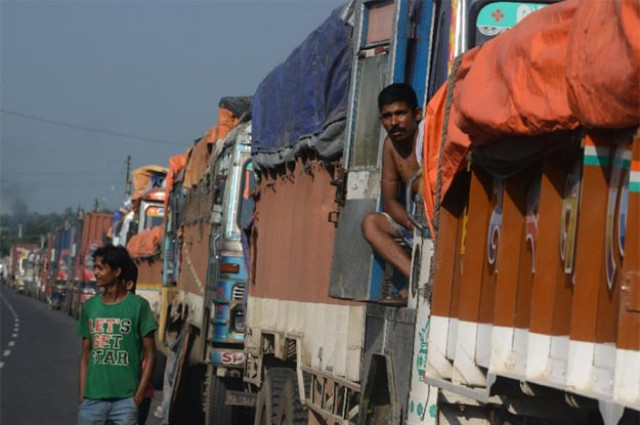
PHOTO: AFP
A queue of little red cylinders snakes through women and children as they wait for their turn to purchase cooking gas. The metal vessels are chained together and the line stretches to half a mile. A local tells me it takes hours and sometimes days to get the cylinders refilled and due to acute shortage of fuel, the containers are often half-filled at double the cost.
Life in Nepal has changed for worse. A country still recovering from the damages of deadly earthquakes early this year is now faced with an economic crisis as a result of disruption in trade with India. Public buses are overcrowded and cars have to wait for hours to get their tanks filled; restaurants are not serving everything on their menu and hotels leave a note in the room apologising for reduced services – some smaller ones provide you with candles and a match box to survive power outages; a taxi ride is three times more expensive and shopping as a foreigner is no more dirt cheap.
While tourists come and go, Nepalis are living in these difficult circumstances for over two months when protests against the country’s new constitution first began. The ethnic Madhesi community living in the south feels the law marginalises them and wants to amend it. India, having close ties with the Madhesis, is believed to be supporting the protesters and has imposed an unofficial trade blockade; however, the Narendra Modi-government denies these accusations.

Being a landlocked country, Nepal is heavily dependent on India for trade. Government data from 2013 show that 66% of Nepal’s total external trade was done with the southern neighbour and that is why when trucks carrying petroleum products, cooking gas and other essentials stopped crossing border posts, even the post apolitical Nepali felt the wrath.
Fallout
Asian Development Bank’s (ADB) Country Director for Nepal Kenichi Yokoyama says the crisis has directly affected the common people who have to wait at petrol stations for eight to nine hours or even a day sometimes to get fuel and that too at a price four times higher than usual.
“When I speak to restaurant owners and hoteliers, they tell me they have been severely affected because of the shortages; for a tourist season when occupancy is around 80%, the rooms are only 20% full,” the ADB country director shares. The traffic on the roads has also reduced by 40-50%, he adds.
Shova Dhugana’s story only validates these numbers. The 27-year-old owner of a small-scale food outlet has seen her monthly expenses going up and earnings plummeting since the crisis started. “It has been hard the past couple of months; no cooking gas or kerosene to prepare food plus everything is more costly be it cooking oil, sugar or packaged food like instant noodles,” the young Kathmandu entrepreneur shares.

Dhugana has increased the price of all the items on her menu by Rs10 but even then, it is hard for her to make any profit. “Business has been down because we cannot serve everything on the menu and have to rely on induction cookers and firewood to cook; also, we cannot use induction cookers whenever we want due to load shedding and firewood is expensive,” Dhugana says, explaining that even if she buys firewood worth Rs6000 to Rs7000, it hardly lasts a month.
Life at home is not any different. Dhugana tells us the children suffer the most as it now takes longer to make food. “The situation is such that even if we are willing to pay more, we cannot get what we need,” the owner laments.
Shreena Shrestha, an architect by profession, also knows people who are not cooking their meals anymore. “So many people in my neighbourhood are eating bread or beaten rice rather than cooked food while some are using electric heater for cooking which I fear will increase the country’s electricity consumption and lead to more load shedding,” Shrestha states.
News reports show the ongoing crisis has forced schools to cut short learning hours while hospital services are also hampered as doctors, medical personnel and life-saving drugs fail to reach patients on time.
As the economic crisis worsens and political leaders fail to reach an agreement, ADB’s Yokoyama forecasts Nepal to have a growth rate way below the pre-crisis estimate of 6%. “The economy will recover to achieve the growth rate of 1.278% if the crisis is resolved in the next one month but if the turmoil persists till the end of the fiscal year which is July, the growth might be negative and stand at -1%,” the country director fears.
Politicking
In a country as small as Nepal, architect Shrestha finds it troubling to see an ethnic group ask for a separate state. “If they are given a separate state, they will have similar economic blockades in the future,” she tries to reason, hinting it would be far worse for a smaller state to deal with India. Also, she believes, state should provide equal rights to the people of all races. “No one ethnic group has the right to ask for any special treatment or a separate state,” Shrestha argues.
She further accuses India of breaking international law by hindering border trade. “The Convention on Transit Trade of Landlocked States clearly says that countries like Nepal should not have economic blockades like the present one,” the architect stresses, adding that instead of helping its earthquake-hit neighbour, India is busy achieving its selfish economic and religious goals.
Entrepreneur Dhugana also blames Madhesi leaders for conspiring with India against Nepal but calls on them to realise how their Nepali ‘brothers’ are suffering from the protests and put an end to their miseries. Anger against India may be rising in the country but Yokoyama says people are also realizing that the government needs to take action to fix this problem both internally and externally. “The core issue is the dispute over the new constitution and Madhesi community’s demand of population-based representation; it is a highly contentious matter but the political parties are realizing this needs to be resolved soon,” he adds.
Published in The Express Tribune, December 3rd, 2015.

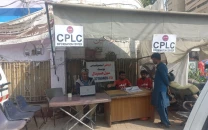

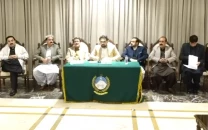

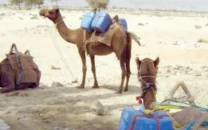


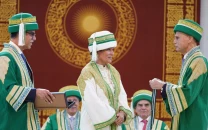

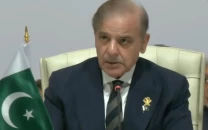
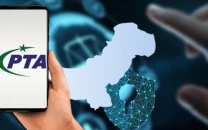







COMMENTS
Comments are moderated and generally will be posted if they are on-topic and not abusive.
For more information, please see our Comments FAQ